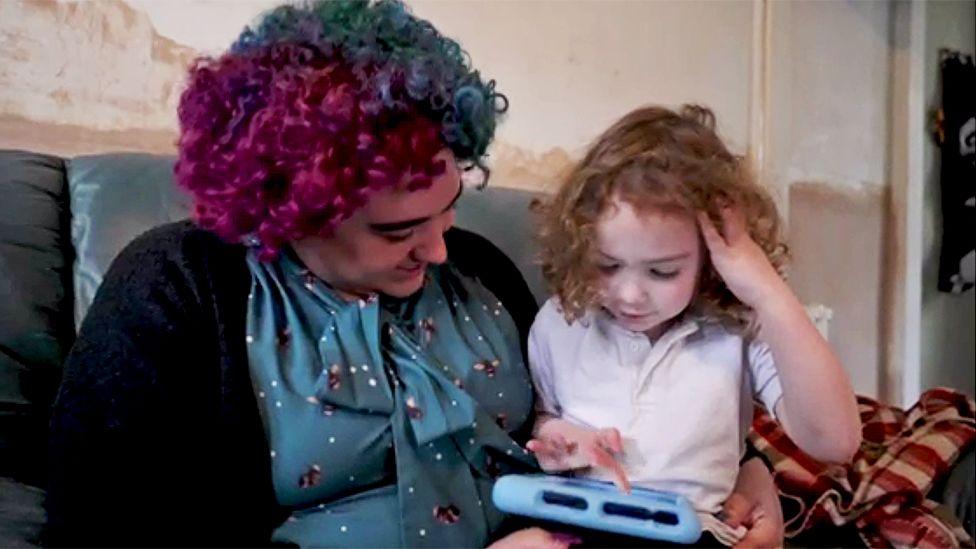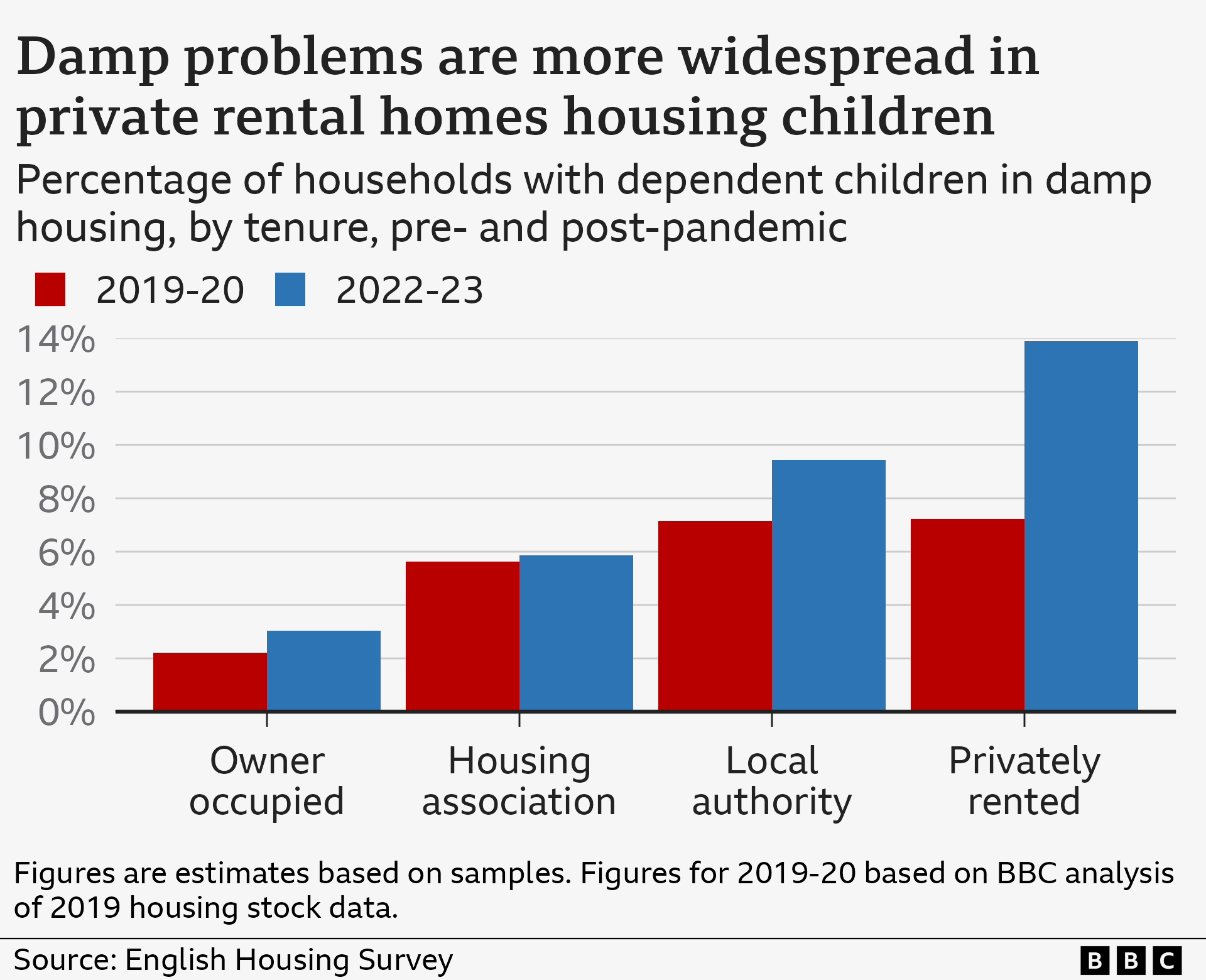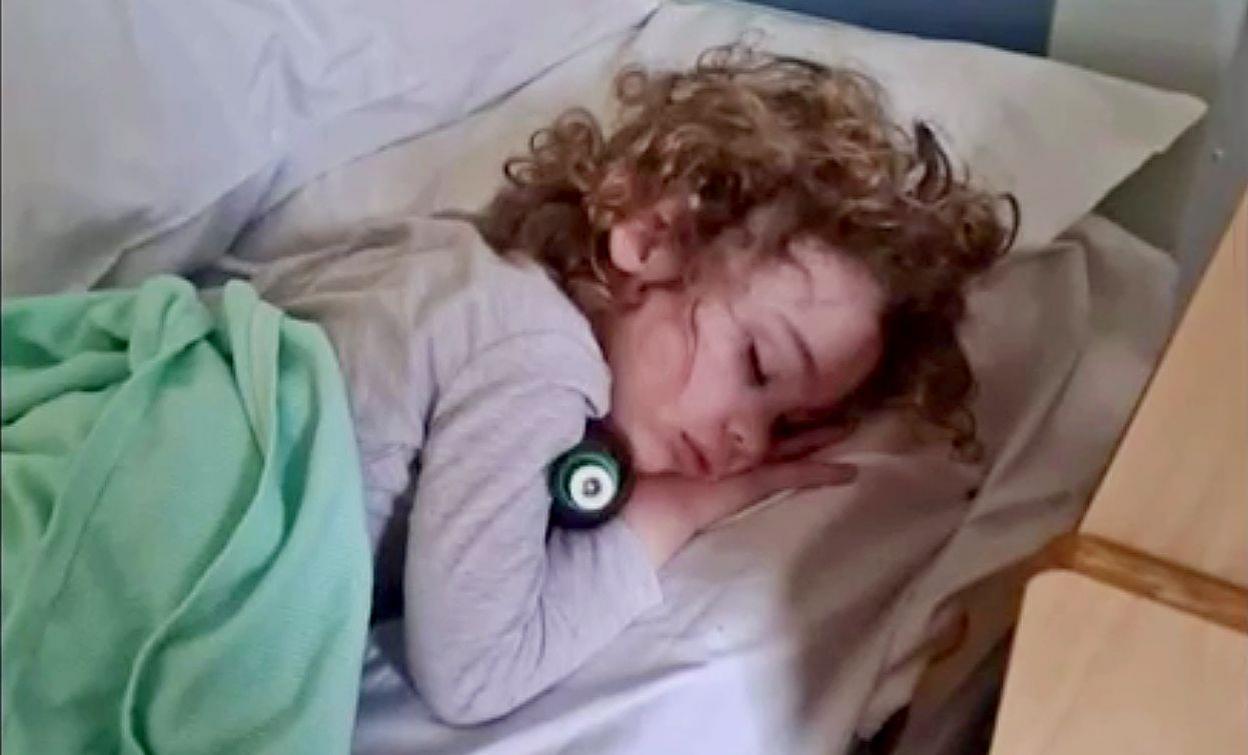More children in damp rental homes, figures show

Tatiana's son, four, was treated for a lung infection
- Published
The proportion of private renters with children who are living in damp homes has almost doubled since the pandemic, BBC analysis suggests.
The figure has risen from one in 14 households before the pandemic to one in seven in 2022-23, according to the English Housing Survey.
One charity said it had been “deluged” with reports of poor housing since the pandemic, with many private renters too afraid of eviction to complain.
The National Residential Landlords Association said there were "many challenges facing the sector", but the "vast majority of renters are satisfied".
Housing minister Matthew Pennycook described the number of children living in poor quality housing as “utterly shocking”.
“This is why we are taking decisive action to raise standards and protect tenants from exploitation,” he said.

Across all types of tenure, 1.5 million children were thought to be living in homes that failed decency standards in 2022-23, according to the survey.
The government has announced plans for a Renters' Rights Bill, which will abolish Section 21 "no-fault" evictions and extend Awaab's Law to the private rented sector to encourage landlords to fix hazards.
It comes after a bill designed to reform renting failed to become legislation before Parliament was shut down before the July general election.
There were about 208,000 households with children in damp private accommodation in 2022-23, according to the latest English Housing Survey,, external up from just over 122,000 in the pre-pandemic period 2019-20.
The estimates are based on internal and external inspections of a sample of homes across the country. It is the first year since the pandemic where the survey has been able to go into homes to inspect them, although some modelled data was still used.
The government-run survey only records damp significant enough to feature in health and safety reports, so minor issues are not counted.
Households with children who are privately renting are more likely to live in housing with a damp problem than those without, according to the survey. One in 13 households without children who are renting privately have damp issues, it said.
Damp is more common in the privately rented sector than in owner-occupied homes, those provided by local authorities, or housing associations.
'My child ended up in hospital'
Tatiana, 28, said she noticed mould on the walls when she went to view a house in Bradford, but she only had a few weeks to find a home and was assured the problem would be fixed.
She said she did not think she had much choice other than to accept the house and move in, along with her partner and young son.
“You could smell [the mould] when you walked into the house, as if somebody had left a massive wet towel," she said.
A few weeks after moving in, Tatiana's three-year-old was taken to hospital for three days to be treated for a lung infection. Testing showed it was caused by fungus, she said.

“He nearly died,” said Tatiana. “My child ended up in hospital because [the landlord] decided to not use part of [their] profits to make sure [the] property was up to standard.”
The landlord told BBC News they sympathised with Tatiana's situation regarding her son's health, "but we firmly believe that all necessary steps were taken to provide a safe home.
“Any issues raised after moving in were promptly addressed.”
They added that after Tatiana raised concerns about dampness they took "comprehensive measures to rectify the situation” including around £10,000 of damp-proofing work.
The family has remained at the property, and Tatiana says her son is "completely fine now" and back to being a "happy little boy".
The landlord also told BBC News they “categorically refute" that Tatiana noticed mould on the walls when she viewed the flat and say it was professionally cleaned before being let out.
John Hume, from health equity charity the People’s Health Trust, said that although some children were becoming acutely unwell as a result of poor housing conditions, others were experiencing chronic health problems.
“We've seen other [parents] who report: ‘My child's just sick more, they're just worse than they normally are and they're starting to miss school.”
Mr Hume said his organisation had realised there were "major" housing issues just before the pandemic, but it heard less about housing conditions during lockdown restrictions.
“People were much more concerned about other things, so we didn't get a lot of feedback during that time, however, immediately afterwards, we were deluged,” he said.
'Safeguards completely missing'
Polly Neate, the chief executive of housing charity Shelter, said rising rents had exacerbated problems for those on the lowest incomes.
“As the ‘unaffordability’ gets worse, the level of disrepair that the people on low incomes have to put up with also gets worse,” she said.
She said plans to abolish Section 21 “no-fault” evictions were urgently needed for improving housing standards: “People don't complain because they think that they can get evicted.”
Shelter is calling on the government to build more homes for affordable rents and introduce standards to the private rental sector that are enforced.
“Safeguards are completely missing at the moment,” said Ms Neate.
The English Housing Survey found three-and-a-half million households in England lived in a home that failed to meet the Decent Homes Standard, and one million households lived with damp.
Thousands report mouldy and damp homes
- Published25 March 2024
'I fear my mould-infested flat is going to kill me'
- Published13 November 2023
Propertymark, a membership body for property agents, said it "has always argued that agents, landlords, and tenants should work together to keep air moisture in a rental property under control".
It said the government must ensure "no-fault" evictions were "replaced with a suitable legal mechanism to prevent courts from being overwhelmed with cases”.
The National Residential Landlords Association, which represents 100,000 members said the English Housing Survey showed eight in 10 private renters were satisfied with their accommodation.
Meera Chindooroy, from the organisation, said: “We accept that there are many challenges facing the sector and we will work with the government."
The government said: "Everyone has a right to a healthy and safe place to live, and we are empowering renters in England to raise concerns about damp, dangerous and cold homes, whilst making sure landlords take immediate steps to fix these important repairs.”
Get in touch
Are you personally affected by the issues raised in this story?